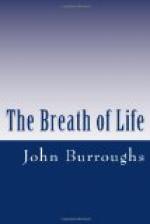II
The naturalist cannot get away from the natural order, and he sees man, and all other forms of life, as an integral part of it—the order, which in inert matter is automatic and fateful, and which in living matter is prophetic and indeterminate; the course of one down the geologic ages, seeking only a mechanical repose, being marked by collisions and disruptions; the other in its course down the biologic ages seeking a vital and unstable repose, being marked by pain, failure, carnage, extinction, and ceaseless struggle with the physical order upon which it depends. Man has taken his chances in the clash of blind matter, and in the warfare of living forms. He has been the pet of no god, the favorite of no power on earth or in heaven. He is one of the fruits of the great cosmic tree, and is subject to the same hazards and failures as the fruit of all other trees. The frosts may nip him in the bud, the storms beat him down, foes of earth and air prey upon him, and hostile influences from all sides impede or mar him. The very forces that uphold him and furnish him his armory of tools and of power, will destroy him the moment he is off his guard. He is like the trainer of wild beasts who, at his peril, for one instant relaxes his mastery over them. Gravity, electricity, fire, flood, hurricane, will crush or consume him if his hand is unsteady or his wits tardy. Nature has dealt with him upon the same terms as with all other forms of life. She has shown him no favor. The same elements—the same water, air, lime, iron, sulphur, oxygen, carbon, and so on—make up his body and his brain as make up theirs, and the same make up theirs as are the constituents of the insensate rocks, soils, and clouds. The same elements, the same atoms and molecules, but a different order; the same solar energy, but working to other ends; the same life principle but lifted to a higher plane. How can we separate man from the total system of things, setting him upon one side and them upon another, making the relation of the two mechanical or accidental? It is only in thought, or in obedience to some creed or philosophy, that we do it. In life, in action, we unconsciously recognize ourselves as a part of Nature. Our success and well-being depend upon the closeness and spontaneousness of the relation.




